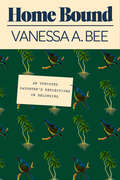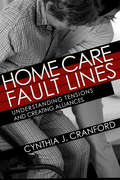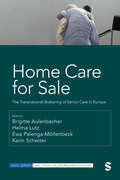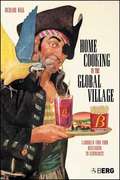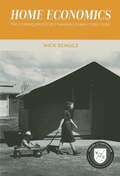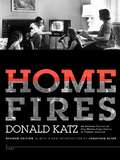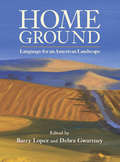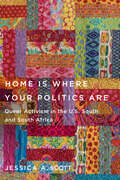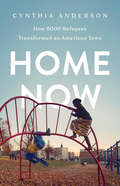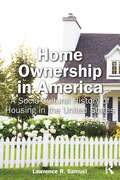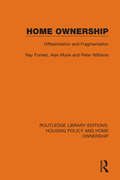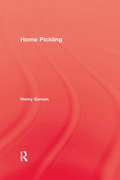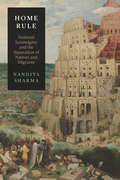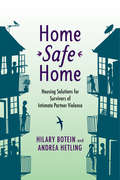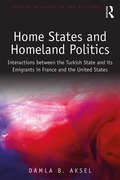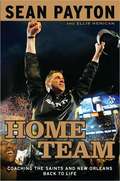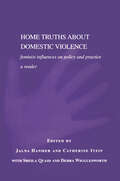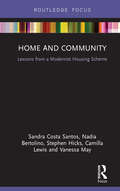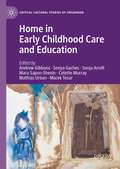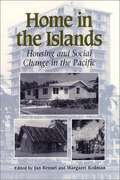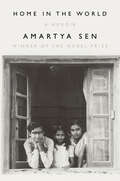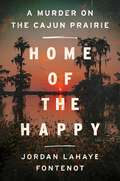- Table View
- List View
Home Bound: An Uprooted Daughter's Reflections on Belonging
by Vanessa A. Bee"Readers of Home Bound will likely experience that pleasant rush of recognizing something personal in someone else&’s reality, of answering, yes, home feels like this to me, too." —Chicago Review of Books"What emerges is a rich and enthralling story of finding oneself outside of the bounds of borders and beliefs. This offers radiant hope in the face of darkness." —Publishers Weekly, starred review"Bee&’s lyrical, emotive prose takes readers through her life with an intimacy that draws and keeps them close. . . . [Home Bound will] appeal to a variety of reader, challenging singular beliefs of what it means to be a daughter, sister, lover, wife, lawyer, and mother." —Library Journal, starred reviewIn this singular and intimate memoir of identity and discovery, Vanessa A. Bee explores the way we define &“home&” and &“belonging&” — from her birth in Yaoundé, Cameroon, to her adoption by her aunt and her aunt&’s white French husband, to experiencing housing insecurity in Europe and her eventual immigration to the US. After her parents&’ divorce, Vanessa traveled with her mother to Lyon and later to London, eventually settling in Reno, Nevada, as a teenager, right around the financial crisis and the collapse of the housing market. At twenty, still a practicing evangelical Christian and newly married, Vanessa applied to and was accepted by Harvard Law School, where she was one of the youngest members of her class. There, she forged a new belief system, divorced her husband, left the church, and, inspired by her tumultuous childhood, pursued a career in economic justice upon graduation.Vanessa&’s adoptive, multiracial, multilingual, multinational, and transcontinental upbringing has caused her to grapple for years with foundational questions such as: What is home? Is it the country we&’re born in, the body we possess, or the name we were given and that identifies us? Is it the house we remember most fondly, the social status assigned to us, or the ideology we forge? What defines us and makes us uniquely who we are?Organized unconventionally around her own dictionary-style definitions of the word &“home,&” Vanessa tackles these timeless questions thematically and unpacks the many layers that contribute to and condition our understanding of ourselves and of our place in the world.
Home Care Fault Lines: Understanding Tensions and Creating Alliances (The Culture and Politics of Health Care Work)
by Cynthia J. CranfordIn this revealing look at home care, Cynthia J. Cranford illustrates how elderly and disabled people and the immigrant women workers who assist them in daily activities develop meaningful relationships even when their different ages, abilities, races, nationalities, and socioeconomic backgrounds generate tension. As Cranford shows, workers can experience devaluation within racialized and gendered class hierarchies, which shapes their pursuit of security. Cranford analyzes the tensions, alliances, and compromises between security for workers and flexibility for elderly and disabled people, and she argues that workers and recipients negotiate flexibility and security within intersecting inequalities in varying ways depending on multiple interacting dynamics. What comes through from Cranford's analysis is the need for deeply democratic alliances across multiple axes of inequality. To support both flexible care and secure work, she argues for an intimate community unionism that advocates for universal state funding, designs culturally sensitive labor market intermediaries run by workers and recipients to help people find jobs or workers, and addresses everyday tensions in home workplaces.
Home Care for Sale: The Transnational Brokering of Senior Care in Europe (SAGE Studies in International Sociology)
by Helma Lutz Ewa Palenga-Möllenbeck Brigitte Aulenbacher Karin SchwiterThe world of senior care provision and care work is changing rapidly. Across Europe, brokering agencies for live-in care workers have become powerful players in reshaping welfare systems, transnational care chains and working conditions. This volume draws together the latest research on live-in home care for seniors in Europe, exploring processes of commodification and marketisation, the transnationalisation of care work, the private household as a workplace, and workers’ contestation of the live-in care arrangement. Together, they depict far-reaching challenges in care provision and care work. "A must-read for anyone wishing to understand the changes in the political economy of care in the 21st century. A compelling exploration of the emergence of care brokerage and agency intermediation in Europe with a variety of examples from different countries and care settings." - Professor Sabrina Marchetti, Ca’ Foscari University of Venice "Essential reading. Rich empirical and conceptual work provides an exhaustive account of the commodification, marketisation, transnationalisation and exploitation in the care industry, all in the context of global and local inequalities. This is a group of amazing critical analysts who dare to confront some of the key contradictions of our current painful social transformation in European terrains." - Professor Attila Melegh, Corvinus University Budapest "An encyclopaedic account of the commodification and marketisation of transnationally-brokered senior home care provision across Europe. It pays close attention to the economic and social inequalities, as well as state policies, that underlie this new migration industry, and the collective efforts to contest and improve conditions of work and care. Home Care for Sale documents the geography of care chains within a divided Europe - a geography that both complements and disrupts conventional understandings of international care chains between the Global North and South. A must-read for those interested in senior home care, social reproduction, migration, border studies and the workings and repercussions of neoliberal state policies." - Professor Géraldine Pratt, University of British Columbia
Home Care for Sale: The Transnational Brokering of Senior Care in Europe (SAGE Studies in International Sociology)
by Helma Lutz Ewa Palenga-Möllenbeck Brigitte Aulenbacher Karin SchwiterThe world of senior care provision and care work is changing rapidly. Across Europe, brokering agencies for live-in care workers have become powerful players in reshaping welfare systems, transnational care chains and working conditions. This volume draws together the latest research on live-in home care for seniors in Europe, exploring processes of commodification and marketisation, the transnationalisation of care work, the private household as a workplace, and workers’ contestation of the live-in care arrangement. Together, they depict far-reaching challenges in care provision and care work. "A must-read for anyone wishing to understand the changes in the political economy of care in the 21st century. A compelling exploration of the emergence of care brokerage and agency intermediation in Europe with a variety of examples from different countries and care settings." - Professor Sabrina Marchetti, Ca’ Foscari University of Venice "Essential reading. Rich empirical and conceptual work provides an exhaustive account of the commodification, marketisation, transnationalisation and exploitation in the care industry, all in the context of global and local inequalities. This is a group of amazing critical analysts who dare to confront some of the key contradictions of our current painful social transformation in European terrains." - Professor Attila Melegh, Corvinus University Budapest "An encyclopaedic account of the commodification and marketisation of transnationally-brokered senior home care provision across Europe. It pays close attention to the economic and social inequalities, as well as state policies, that underlie this new migration industry, and the collective efforts to contest and improve conditions of work and care. Home Care for Sale documents the geography of care chains within a divided Europe - a geography that both complements and disrupts conventional understandings of international care chains between the Global North and South. A must-read for those interested in senior home care, social reproduction, migration, border studies and the workings and repercussions of neoliberal state policies." - Professor Géraldine Pratt, University of British Columbia
Home Cooking in the Global Village: Caribbean Food from Buccaneers to Ecotourists (Anthropology and Material Culture)
by Richard WilkWinner of the Society for Economic Anthropology Annual Book Prize 2008. Belize, a tiny corner of the Caribbean wedged into Central America, has been a fast food nation since buccaneers and pirates first stole ashore. As early as the 1600s it was already caught in the great paradox of globalization: how can you stay local and relish your own home cooking, while tasting the delights of the global marketplace? Menus, recipes and bad colonial poetry combine with Wilk's sharp anthropological insight to give an important new perspective on the perils and problems of globalization.
Home Economics: The Consequences of Changing Family Structure (Values and Capitalism Series)
by Nick SchulzSince the 1950s, divorces and out-of-wedlock births in America have risen dramatically. This has significantly affected the economic wellbeing of the country’s most vulnerable populations. <p><p>In Home Economics: The Consequences of Changing Family Structure, Nick Schulz argues that serious consideration of the consequences of changing family structure is sorely missing from conversations about American economic policy and politics. Apprehending a complete picture of this country’s economic condition will be impossible if poverty, income inequality, wealth disparities, and unemployment alone are taken into consideration, claims Schulz.
Home Fires
by Donald KatzHome Fires is the powerful saga of the Gordon family-real people, names unchanged. Spanning nearly five decades, from the end of World War II to the early 1990s, their story has the scope, depth, wealth of incident, and emotional intensity of a great novel, and an abundance of humor, scandal, warmth, and trauma. A masterful chronicle of the turbulent postwar era, illuminating the interplay between private life and profound cultural changes.Donald Katz begins his account in 1945, when Sam Gordon comes home from the war to his young wife, and two-year-old daughter, eager to move his family into the growing middle class. After a few years in the Bronx, Sam and Eve move to a new Long Island subdivision and have two more children. As the '50s yield to the '60s, the younger Gordons fly out into the culture like shrapnel from an artillery shell, each tracing a unique trajectory.Katz tells the Gordons' story-the unraveling of Sam's and Eve's American dream, to the slow, hopeful reknitting of the family-marshaling a vivid cast of supporting characters. Deftly juxtaposing day-to-day family life with landmark public events, Katz creates a rich and revealing portrait of the second half of 20th century America.
Home Ground
by Debra Gwartney Barry LopezPublished to great acclaim in 2006, the hardcover edition of Home Ground: Language for an American Landscape met with outstanding reviews and strong sales, going into three printings. A language-lover's dream, Home Ground revitalized a descriptive language for the American landscape by combining geography, literature, and folklore in one volume. Now in paperback, this visionary reference is available to an entire new segment of readers. Home Ground brings together 45 poets and writers to create more than 850 original definitions for words that describe our lands and waters. The writers draw from careful research and their own distinctive stylistic, personal, and regional diversity to portray in bright, precise prose the striking complexity of the landscapes we inhabit. Home Ground includes 100 black-and-white line drawings by Molly O'Halloran and an introductory essay by Barry Lopez.
Home Ground
by Debra Gwartney Barry LopezPublished to great acclaim in 2006, the hardcover edition of Home Ground: Language for an American Landscape met with outstanding reviews and strong sales, going into three printings. A language-lover's dream, Home Ground revitalized a descriptive language for the American landscape by combining geography, literature, and folklore in one volume. Now in paperback, this visionary reference is available to an entire new segment of readers. Home Ground brings together 45 poets and writers to create more than 850 original definitions for words that describe our lands and waters. The writers draw from careful research and their own distinctive stylistic, personal, and regional diversity to portray in bright, precise prose the striking complexity of the landscapes we inhabit. Home Ground includes 100 black-and-white line drawings by Molly O'Halloran and an introductory essay by Barry Lopez.
Home Is Where Your Politics Are: Queer Activism in the U.S. South and South Africa
by Jessica A. ScottHome Is Where Your Politics Are is a transnational consideration of queer and trans activism in the US South and South Africa. Through ethnographic exploration of queer and trans activist work in both places, Jessica Scott paints a vibrant picture of what life is like in relation to a narrative that says that queer life is harder, if not impossible, in rural areas and on the African continent. The book asks questions like, what do activists in these places care about and how do stories about where they live get in the way of the life they envision for the queer and trans people for whom they advocate? Answers to these questions provide insight that only these activists have, into the complexity of locally based advocacy strategies in a globalized world.
Home Now: How 6000 Refugees Transformed an American Town
by Cynthia AndersonA moving chronicle of who belongs in America.Like so many American factory towns, Lewiston, Maine, thrived until its mill jobs disappeared and the young began leaving. But then the story unexpectedly veered: over the course of fifteen years, the city became home to thousands of African immigrants and, along the way, turned into one of the most Muslim towns in the US. Now about 6,000 of Lewiston's 36,000 inhabitants are refugees and asylum seekers, many of them Somali. Cynthia Anderson tells the story of this fractious yet resilient city near where she grew up, offering the unfolding drama of a community's reinvention--and humanizing some of the defining political issues in America today. In Lewiston, progress is real but precarious. Anderson takes the reader deep into the lives of both immigrants and lifelong Mainers: a single Muslim mom, an anti-Islamist activist, a Congolese asylum seeker, a Somali community leader. Their lives unfold in these pages as anti-immigrant sentiment rises across the US and national realities collide with those in Lewiston. Home Now gives a poignant account of America's evolving relationship with religion and race, and makes a sensitive yet powerful case for embracing change.
Home Ownership in America: A Socio-Cultural History of Housing in the United States
by Lawrence SamuelA wide-ranging cultural history centered around the concepts of real estate, the family home, and the American dream, and how they evolved over the years, Home Ownership in America: A Socio-Cultural History of Housing in the United States traces narratives around home ownership from the 1920s to today.As a product of the emergence of a large middle class during the Roaring Twenties, the modern concept of home ownership continued through the shaky Great Depression years, holding pattern of World War II, and glory days of the postwar era, when home ownership became a reality for much of the White middle class. While the late 1960s and 1970s were difficult years for home ownership as the postwar economic engine ran out of steam, a renaissance took place in the 1980s and 1990s due to tens of millions of baby boomers wanting to nest. Although there have been a few bumps in the road over the last couple of decades, home ownership, or at least the pursuit of it, is once again booming, making the subject as relevant as ever.With the single-family home central to the American idea and experience, this book touches on a host of issues related to our social divisions of race, gender, and class. Home Ownership in America is a truly interdisciplinary study, crossing over into a wide variety of subjects including sociology, family, urban history/planning, suburban studies, the built environment, public policy, business, finance, economics, politics, architecture, design, technology, and popular and consumer culture.
Home Ownership: Differentiation and Fragmentation
by Peter Williams Alan Murie Ray ForrestOriginally published in 1990 and drawing on extensive research, this book provides an evaluation of the impact of the growth of home ownership in the UK, and of the claims and counter-claims made for its social significance. The book examines critically the evidence for and against the proposition that mass home ownership is contributing towards a more equal society. Wide-ranging in its coverage, the book discusses the changing nature and role of home ownership, wealth accumulation and housing, the relationship between social class and housing tenure, and policy development.
Home Pickling
by Henry SarsonFirst published in 2005. Cooks eager to rediscover the lost culinary art of pickling will be weIl served by this fascinating and informative text, written by the founder of the best-known vinegar and pickling company in the United Kingdom. Beginning with an explanation of the history of pickling, principles and advantages, the book goes on to give detailed instructions on the preservation of artichokes, beans, beetroot, cabbage, shallots, tomatoes, peaches, cherries, a wide variety of chutneys and ketchups, meats and many other foods. Instructions are also given for mixing spices and determining correct levels of acidity and brine.
Home Rule: National Sovereignty and the Separation of Natives and Migrants
by Nandita SharmaIn Home Rule Nandita Sharma traces the historical formation and political separation of Natives and Migrants from the nineteenth century to the present to theorize the portrayal of Migrants as “colonial invaders.” The imperial-state category of Native, initially a mark of colonized status, has been revitalized in what Sharma terms the Postcolonial New World Order of nation-states. Under postcolonial rule, claims to autochthony—being the Native “people of a place”—are mobilized to define true national belonging. Consequently, Migrants—the quintessential “people out of place”—increasingly face exclusion, expulsion, or even extermination. This turn to autochthony has led to a hardening of nationalism(s). Criteria for political membership have shrunk, immigration controls have intensified, all while practices of expropriation and exploitation have expanded. Such politics exemplify the postcolonial politics of national sovereignty, a politics that Sharma sees as containing our dreams of decolonization. Home Rule rejects nationalisms and calls for the dissolution of the ruling categories of Native and Migrant so we can build a common, worldly place where our fundamental liberty to stay and move is realized.
Home Safe Home: Housing Solutions for Survivors of Intimate Partner Violence
by Andrea Hetling Carol Corden Hilary BoteinHousing matters for everyone, as it provides shelter, security, privacy, and stability. For survivors of intimate partner violence (IPV), housing takes on an additional meaning; it is the key to establishing a new life, free from abuse. IPV survivors often face such inadequate housing options, however, that they must make excruciating choices between cycling through temporary shelters, becoming homeless, or returning to their abusers. Home Safe Home offers a multifaceted analysis that accounts for both IPV survivors' needs and the practical challenges involved in providing them with adequate permanent housing. Incorporating the varied perspectives of the numerous housing providers, activists, policymakers, and researchers who have a stake in these issues, the book also lets IPV survivors have their say, expressing their views on what housing and services can best meet their short and long-term goals. Researchers Hilary Botein and Andrea Hetling not only examine the federal and state policies and funding programs determining housing for IPV survivors, but also provide detailed case studies that put a human face on these policy issues. As it traces how housing options and support mechanisms for IPV survivors have evolved over time, Home Safe Home also offers innovative suggestions for how policymakers and advocates might work together to better meet the needs of this vulnerable population.
Home States and Homeland Politics: Interactions between the Turkish State and its Emigrants in France and the United States (Studies in Migration and Diaspora)
by Damla B. AkselThis book draws on the literatures of transnationalism and diaspora studies to explore the ways in which the policies of emigrant-sending countries have an influence on how emigrants politically engage on issues related to their homelands. Drawing on over one hundred interviews with policy makers, diplomats, bureaucrats, members of civil society and academics in Turkey, France and the United States, it offers a comparison of the engagement of Turkish migrants with political issues in Turkey in periods both before and after home state policies have been constructed with a view to engaging emigrants. As such, it will appeal to scholars of sociology and politics with interests in diaspora and the engagement of migrants with political issues in their countries of origin.
Home Team: Coaching the Saints and New Orleans Back to Life
by Sean Payton Ellis HenicanA story of a city recovering from disaster of Hurricane Katrina and a team with a history of heartbreak. The inspirational true story tells how one man led a football team-- and a city-- to triumph in Super Bowl XLIV.
Home Truths About Domestic Violence: Feminist Influences on Policy and Practice - A Reader
by Jalna Hanmer Catherine ItzinWhile men's violence to women is an everyday culturally supported activity, this reader demonstrates: that men's violence can be curtailed and that women and children can be assisted effectively; that state policies and provision can be improved; and that women can actively participate in the resolution of their difficulties. Bringing together new work and key papers Home Truths About Domestic Violence provides a comprehensive overview and up-to-date account of the progress so far, and identifies what still needs to be done. Areas covered include: * womens experience of violence * childrens experience of violence * personal experiences of the justice system * state policies on violence in the US and UK * educational programmes and initiatives. This substantial Reader makes a significant contribution to the understanding of domestic violence from both a policy and a practice perspective. Together with its companion volume Home Truths About Child Sexual Abuse it provides an in-depth resource for a wide range of teachers, students and professionals, highlighting the diverse and complex dimensions of the problem of domestic violence.
Home and Community: Lessons from a Modernist Housing Scheme
by Vanessa May Stephen Hicks Camilla Lewis Sandra Costa Santos Nadia BertolinoExamining the relationships between architecture, home and community in the Claremont Court housing scheme in Edinburgh, Home and Community provides a novel perspective on the enabling potential of architecture that encompasses physical, spatial, relational and temporal phenomena. Based on the AHRC funded project "Place and Belonging", the chapters draw on innovative spatial layouts amid Scottish policymakers' concerns of social change in the 1960s, to develop theoretical understandings between architecture, home, and community. By approaching the discourse on home, and by positioning the home at the confluence of a network of sociocultural identities bound by spatial awareness and design, the writers draw on sociological interpretations of cultural negotiation as well as theoretical underpinnings in architectural design. In so doing, they suggest a reinterpretation of the facilitating role of architecture as sensitive to physical and socio-cultural reconstruction. Drawn from interviews with residents, architectural surveys, contextual mapping and other visual methods, Home and Community explores home as a construct that is enmeshed with the architectural affordances that the housing scheme represents, that is useful to both architecture and sociology students, as well as practitioners and urban planners.
Home in Early Childhood Care and Education: Conceptualizations and Reconfigurations (Critical Cultural Studies of Childhood)
by Mara Sapon-Shevin Marek Tesar Mathias Urban Andrew Gibbons Sonja Arndt Colette Murray Sonya GachesThis edited volume investigates the effects of shifting configurations and conceptualizations of the experience and meaning of home as it is embodied in early childhood care and education (ECCE). As the globalized early learning agenda drives more children to attend ECCE institutions, these institutions increasingly employ the concept of home through their curriculum and daily operations by attempting to foster a homelike environment or by incorporating items from children's homes into play. Chapters seek to recognize the complexity of a concept that is often taken for granted by exploring ways of being and thinking that share an interest in the notion of home. Authors offer multiple lenses and approaches to make sense of home as a conceptual space that operates in complex and often interrelated ways, including as an intellectual space, a built environment, a disciplinary technology, and a threshold.
Home in the City
by Alan B. AndersonDuring the past several decades, the Aboriginal population of Canada has become so urbanized that today, the majority of First Nations and Métis people live in cities. Home in the City provides an in-depth analysis of urban Aboriginal housing, living conditions, issues, and trends. Based on extensive research, including interviews with more than three thousand residents, it allows for the emergence of a new, contemporary, and more realistic portrait of Aboriginal people in Canada's urban centres.Home on the City focuses on Saskatoon, which has both one of the highest proportions of Aboriginal residents in the country and the highest percentage of Aboriginal people living below the poverty line. While the book details negative aspects of urban Aboriginal life (such as persistent poverty, health problems, and racism), it also highlights many positive developments: the emergence of an Aboriginal middle class, inner-city renewal, innovative collaboration with municipal and community organizations, and more. Alan B. Anderson and the volume's contributors provide an important resource for understanding contemporary Aboriginal life in Canada.
Home in the Islands: Housing and Social Change in the Pacific
by Jan Rensel Margaret RodmanDiscussing changes in housing from remote islands to urban environments in the Pacific.
Home in the World: A Memoir
by Amartya SenFrom Nobel Prize winner Amartya Sen, a long-awaited memoir about home, belonging, inequality, and identity, recounting a singular life devoted to betterment of humanity. The Nobel laureate Amartya Sen is one of a handful of people who may truly be called “a global intellectual” (Financial Times). A towering figure in the field of economics, Sen is perhaps best known for his work on poverty and famine, as inspired by events in his boyhood home of West Bengal, India. But Sen has, in fact, called many places “home,” including Dhaka, in modern Bangladesh; Kolkata, where he first studied economics; and Trinity College, Cambridge, where he engaged with the greatest minds of his generation. In Home in the World, these “homes” collectively form an unparalleled and profoundly truthful vision of twentieth- and twenty-first-century life. Here Sen, “one of the most distinguished minds of our time” (New York Review of Books), interweaves scenes from his remarkable life with candid philosophical reflections on economics, welfare, and social justice, demonstrating how his experiences—in Asia, Europe, and later America—vitally informed his work. In exquisite prose, Sen evokes his childhood travels on the rivers of Bengal, as well as the “quiet beauty” of Dhaka. The Mandalay of Orwell and Kipling is recast as a flourishing cultural center with pagodas, palaces, and bazaars, “always humming with intriguing activities.” With characteristic moral clarity and compassion, Sen reflects on the cataclysmic events that soon tore his world asunder, from the Bengal famine of 1943 to the struggle for Indian independence against colonial tyranny—and the outbreak of political violence that accompanied the end of British rule. Witnessing these lacerating tragedies only amplified Sen’s sense of social purpose. He went on to study famine and inequality, wholly reconstructing theories of social choice and development. In 1998, he was awarded the Nobel Prize for his contributions to welfare economics, which included a fuller understanding of poverty as the deprivation of human capability. Still Sen, a tireless champion of the dispossessed, remains an activist, working now as ever to empower vulnerable minorities and break down walls among warring ethnic groups. As much a book of penetrating ideas as of people and places, Home in the World is the ultimate “portrait of a citizen of the world” (Spectator), telling an extraordinary story of human empathy across distance and time, and above all, of being at home in the world.
Home of the Happy: A Murder on the Cajun Prairie
by Jordan LaHaye Fontenot"Riveting and atmospheric, Home of the Happy is also a heartfelt grappling with a trauma in the author’s family and her attempts to unravel its secrets once and for all. LaHaye Fontenot’s writing is urgent, fueled not just by a desire for justice but by love for her ancestors and the Cajun community of south Louisiana. A must-read for true crime and mystery fans."— Ana Reyes, New York Times bestselling author of The House in the PinesOn January 16, 1983, Aubrey LaHaye’s body was found floating in the Bayou Nezpique. His kidnapping ten days before sparked “the biggest manhunt in the history of Evangeline Parish.” But his descendants would hear the story as lore, in whispers of the dreadful day the FBI landed a helicopter in the family’s front lawn and set out on horseback to search for the seventy-year-old banker.Decades later, Aubrey’s great-granddaughter Jordan LaHaye Fontenot asked her father, the parish urologist, to tell the full story. He revealed that to this day, every few months, one of his patients will bring up his grandfather’s murder, and the man accused of killing him, John Brady Balfa, who remains at the Louisiana State Penitentiary at Angola serving a life sentence. They’ll say, in so many words: “Dr. Marcel, I really don’t think that Balfa boy killed your granddaddy.” For readers of Maggie Nelson’s The Red Parts and Emma Copley Eisenberg's The Third Rainbow Girl, Home of the Happy unravels the layers of suffering borne of this brutal crime—and investigates the mysteries that linger beneath generations of silence. Is it possible that an innocent man languishes in prison, still, wrongly convicted of murdering the author’s great-grandfather?
